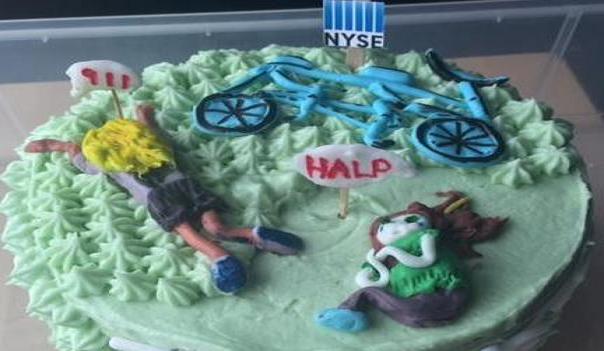


On July 8, 2015 at 11:32:57, trades and quotes stopped updating from the NYSE. Trading eventually resumed at 3:10pm.
Timeline up to the halt.
Trades from NY-ARCA (red) and NYSE (blue) when NYSE halted (note the disappearance of the blue dots).
NYSE trades when NYSE halted. (This is the chart Stephen Colbert used on the The Late Show)
NYSE trades when NYSE resumed.
On a typical trading day, quotes from the NYSE set the NBBO (National Best Bid/Offer) more than 60% of the time - beating out 10 other exchanges. You would think that losing NYSE's quote would severely impact the Retail Investor's trading experience.
Below is the same chart as above but on the day of the NYSE halt. Right at the open we can see there's a problem. Then NYSE's quote disappears, mostly replaced by Nasdaq.
There is also this excellent study of how trades fared among different exchanges, which is worth reading. What they found: the NYSE has great executions compared to other exchanges.
"Even though the NYSE floor is down, the NYSE Arca exchange is still operating.
A retail investor who wants to trade Exxon will see no impact from the outage."
James Angel, Georgetown business school finance professor to Business Insider
The Street.com article below is representative of how most main stream news media were spinning the NYSE halt story: Retail was having a rough day! It's hard to fault them, given how important NYSE's quote is for NYSE stocks.
Later in the day, when no evidence surfaced of Retail Investors having trouble, a few began questioning the news spin.
When it was clear that Retail Investors weren't impacted, the search was on for what was behind the miracle "success story".
Without any evidence or a basic understand of retail order execution, some went so far as to claim stock market fragmentation saved the day. (We think Pisani got it dead wrong).
Naturally, Modern Markets, the High Frequency Trading (HFT) Lobbyist, was quick to claim another benefit of HFT!
They saved the day! Naturally. For a good look at how far lobbyists will go to spin
a story (and probably more disturbing, how far a major network will let them), please
watch this short video.
A few of those who really understood where retail stock orders execute spoke the truth:
But wait a minute, can Chris Nagy be right? After all, we know that the NYSE sets the best prices more than 60% of the time. Without NYSE's best prices, there had to be some harm, right?
Retail orders execute on the NYSE, right?
Well, in a word: NO.
What the news media conveniently (or intentionally) forgot to ask and investigate:
What really happens to the Retail Investor order?
Answering part of that question is a simple matter of searching SEC required 606 reports from each retail broker.
The following list is by no means complete. For brokers not listed, simply Google "BrokerName 606 Report".
Here's what we found:
1. Schwab Doesn't Route to NYSE
2. Vanguard Brokerage Doesn't Route to NYSE
3. E*Trade Doesn't Route to NYSE
4. Fidelity Retail Brokerage Doesn't Route to NYSE
5. Scottrade Doesn't Route to NYSE
6. Credit Suisse (Private Client Services no less) Doesn't Route to NYSE (or anywhere else!)
7. Morgan Stanley Wealth Management Doesn't Route to NYSE
8. Edward Jones Doesn't Route to NYSE
9. Northern Trust Doesn't Route to NYSE
10. Wells Fargo Doesn't Route to NYSE
11. Lightspeed Doesn't Route to NYSE
12. TradeKing Doesn't Route to NYSE
13. Citigroup Doesn't Route to NYSE (Note: Citi isn't retail, but as they own ATD we found this very interesting)
Now you know why Retail Investors didn't have a problem with the NYSE being out of service - retail orders rarely route to the NYSE.
For Retail Investors, the NYSE is ALWAYS OUT OF SERVICE.
Which leads to the inevitable question..
The simple answer: to the highest contracted bidder. Stock "wholesalers" or internalizers like Citadel or Knight pay retail brokers lots of cash to execute retail trades, essentially creating a "third market". Why? Because in a high frequency trading world, where stock prices have never been more fuzzy to the end user, but crystal clear to those that spend enormous sums on colocation and PhD employees, it's never been easier to print money (not unlike Bernie Madoff's scheme in the 90's). But that is the subject of a much, much longer story. Someone should write a book.
In the meantime, we strongly encourage you to read this fabulous guide, written by an industry insider. This guide shines much needed light on how Wall Street treats (games) each type of Retail Investor order.